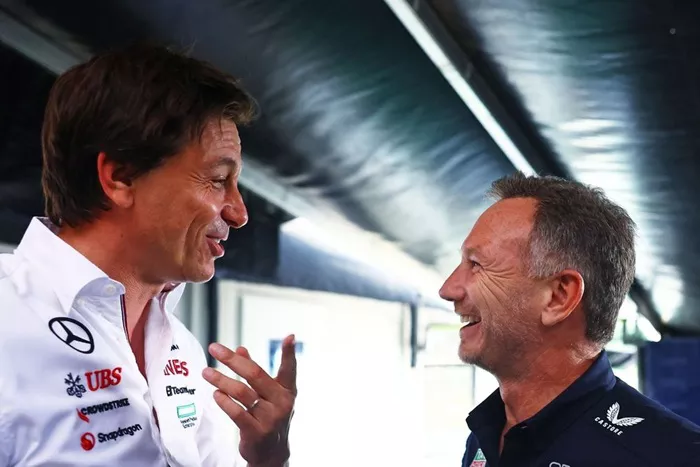Mercedes team principal Toto Wolff and his Red Bull counterpart Christian Horner have found themselves in another dispute — this time over Formula 1’s 2026 engine regulations and the brief revival of hopes for a return to V10 engines.
The two longest-serving team bosses in the sport have a history of high-profile disagreements. Their latest clash centers on a reported proposal to revisit the upcoming power unit rules, just months before their introduction.
Rumors of a potential comeback for V10 engines gained traction after FIA president Mohammed Ben Sulayem was said to be exploring the idea. This created excitement among fans who miss the sound and power of the older engines. However, those hopes were quickly dashed during the Bahrain Grand Prix weekend. Senior figures, including Wolff and Horner, met to discuss the matter and agreed that the current regulations should remain in place.
Wolff dismissed the late proposal as unserious. Speaking to media during the Saudi Arabian Grand Prix, he compared the idea to online political debates.
“Reading the agenda of the F1 Commission is almost as hilarious as reading some of the comments I see on Twitter about American politics,” Wolff said. “I really want to avoid commenting, but it’s a joke. Just a week ago, we had an engine meeting, and then this ends up on the agenda again.”
The FIA officially announced the new 2026 engine rules on August 16, 2022. These rules aim to promote sustainability through increased use of battery power and fully sustainable fuels. The changes have attracted major automotive brands, including Ford, Audi, and General Motors, while also convincing Honda to remain in the sport.
Given the level of commitment already made by manufacturers, any changes to the regulations were always going to be unlikely. However, Horner disagreed with Wolff’s view and insisted that the topic had been under discussion for years.
“They [Mercedes] seem very confident in the work they’ve done for next year,” Horner said. “But this is something we asked to be reviewed two years ago. We didn’t push for it to be on this week’s agenda.”
Horner explained that the FIA had taken the lead in reviewing the rules. He said the governing body wanted to prevent too much lifting and coasting during races, which could harm the sport’s entertainment value and frustrate drivers.
“We haven’t lobbied for it or requested it,” Horner added. “If the FIA believes it’s in the best interest of the sport, then we have to support that.”
When asked about the concerns over lifting and coasting, Horner said the issue was predictable and should have been addressed earlier.
“The faster the cars go through the corners, the bigger the problem becomes,” he said. “Designers will always aim for more cornering speed, and that only makes the situation worse.”
Despite the late timing, Horner showed some support for the ideas being discussed.
“What they’ve suggested — a push-to-pass system during races — actually seems pretty reasonable,” he noted. “Ideally, we should have considered it two years ago, but we’re still ten months away from racing. I don’t see it as a major issue.”

